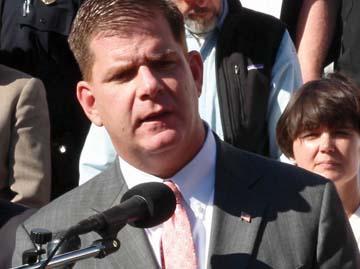October 25, 2012

State Rep. Marty Walsh speaking out against a marijuana ballot question on Monday. Mike Deehan/SHNS photo
Opponents of a ballot initiative to legalize medical marijuana claimed on Monday that proponents ultimately hope to legalize the drug for all uses, but proponents accused them of using “hysteria and fear” to keep people from necessary medicine.
The two sides met in front of the State House steps on a sunny afternoon, where doctors and lawmakers on each side made their case, backed by those who said they suffered through the lack of proper pain relief, on one side, and those who had experienced the perils of drug addiction, on the other.
“There is no restriction whatsoever on these marijuana treatment centers, where they ought to go,” said Sen. John Keenan (D-Quincy), speaking from the microphone and backed by a phalanx of recovering drug addicts. He described the proposed legislation as “vague, ambiguous and open to exploitation.”
Proponents of Question 3 waited until the opponents’ event was over to make their case for legalizing and regulating marijuana for medicinal use. They pointed out the proposed legislation would create a felony for anyone who tries to fraudulently use it, and said the state Department of Public Health would regulate where treatment centers can 2locate and how long a treatment card can be used by a patient.
“There’s no property of medical marijuana that causes people to die,” said Dr. Karen Munkacy, of Newton, who said medical marijuana is a “gateway backwards,” leading people off of addictive and harmful painkillers.
Opponents of the ballot question said that it would contribute to a trend started by a successful 2008 ballot law, which decriminalized possession of less than one ounce of marijuana. They said Question 3 would send a confusing message to children and would make marijuana more available for abuse.
“I have family members that have passed away because of the use and abuse of drugs, and people start with marijuana,” said Rep. Martin Walsh (D-Dorchester). “People start by smoking that innocent joint.”
After the event, in a sidewalk debate with Munkacy and Rep. Frank Smizik (D-Brookline) that eventually involved Keenan, Walsh said, “I’m concerned about the kids behind me up on the stairs,” gesturing to young people in recovery who attended the rally against the ballot question. Walsh said he assumed 70 percent of the recovering addicts there “started their addiction by smoking weed, smoking marijuana.”
“They didn’t get it from a physician,” Smizik responded in defense of the ballot question. Smizik, who said he does not support full legalization of the drug, has filed medical marijuana bills several times over his career.
Keenan stated that lax regulation could result in marijuana being diverted from legal medical use and that doctors may abuse the system even if it means a potential jail term or loss of license.
“People take risks all the time. They take risks when this is involved,” Keenan said as he gestured with his hand to symbolize money was at stake.
As the parties separated, Walsh shook Smizik’s hand and told him, “You’re wrong about this one, Frank.”
Keenan said he saw nothing “of value” in the proposed legislation and told reporters that if voters pass it, the Legislature should look to change it.
“At this stage, I think we have to get beyond the ballot question, look at that. If it fails, then I think we take a step back. If it passes, I think we have to take a look at it, look at ways to improve it, to see what the Legislature can do to put the safeguards in place: the prescription monitoring program to make sure it’s not being used as a front, to make sure the drugs aren’t making their ways to the streets illegally,” Keenan said.
The issue has been raised before on Beacon Hill.
Karen Hawkes, a retired State Police officer from Rowley who started vaporizing marijuana after a stroke debilitated her, said she had testified at the State House, as have other proponents.
Frustrated by the lack of action in the Legislature on their proposal, proponents this year circumvented Beacon Hill by gathering enough signatures to place the medical marijuana question on the ballot.
Gov. Deval Patrick has said, “I don’t have a lot of enthusiasm for the medical marijuana,” a sentiment that was echoed by House Speaker Robert DeLeo in a brief interview on Monday.
“I really have problems with it. I’ll tell you the reason why. This past summer, I attended some seven wakes for people in my district with drug overdoses. That’s just in Revere and Winthrop, alone,” DeLeo said, saying he is concerned about the lack of “protections” in the proposal.
Voters have recently shown more interest in revising the state’s policy toward marijuana. In 2008, voters decriminalized possession of less than an ounce of marijuana by an almost two-to-one ratio and Question 3 has polled well this year.
Jerome Smith, a Fall River man who was left paralyzed from the waist down by an auto accident, said pain cures left him dazed and lethargic until he started treating his symptoms with marijuana, which he eats.
“It’s helped me get off many prescription medications,” Smith told the News Service. “It gave me the ambition to get out and see things again.”
Question 3 opponent Dr. James Broadhurst told the News Service the proposed legislation could be improved if the doctors allowed to prescribe it were limited to certain specialists – neurologists, oncologists and pain specialists – and if there was only one supplier. Broadhurst questioned DPH’s ability to oversee a new medical marijuana system with as many as 35 treatment centers.
“They have a hard enough time inspecting compounding centers,” Broadhurst told the News Service.
Topics:


